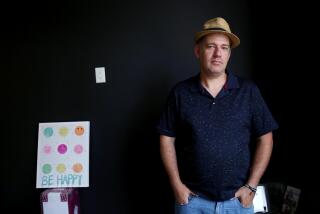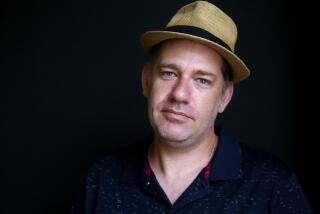Leading O.C. Builder Finds Resignation His Toughest Job
- Share via
Like most self-made millionaires, developer John D. Lusk could see things that others didn’t.
After World War II, when many banks wanted to cut back on housing loans because a shrinking defense industry had tightened the economy, Lusk did just the opposite. He left his job as a vice president of Security Pacific Bank in Los Angeles at age 39 and started his own housing development company.
Last week, the 85-year-old founder of Lusk Co. stepped down as chief executive of the company that he built into an industry leader: a resignation that tore him up emotionally, associates say, but one that he believed was necessary for the survival of the multibillion-dollar business.
Lusk cited the “recessional economic pressures” dogging the housing industry as the reason for his decision. He told associates that he felt it necessary to bring in a new management team to reorganize the company and reduce its debt by selling some of its assets.
He and his son, William D. Lusk, 64, still own the company and will remain as chairman and vice chairman, respectively, but Lusk is leaving the day-to-day operations of his huge construction empire.
Still, he remains a key part of the history of the postwar boom that transformed Southern California from truck farms and orange groves into a network of bustling cities and bedroom communities linked by acres of sprawling industrial parks.
“All great builders are the last of the cowboys in America--independent, sure of themselves and willing to gamble everything they have,” said Gil Ferguson, a former development company executive and current state Assemblyman who has known Lusk for more than 20 years. “He’s been a great role model for a lot of builders; he is the premier, a class act.”
Giant is a word many in the building business use to describe Lusk--often followed closely by visionary and philanthropist.
There were a lot of independent builders nailing together custom homes in the Los Angeles hills in 1946 when John Lusk joined their ranks. But few kept up with the lanky former banker.
He started as an entrepreneur and he ran his business for 46 years as an entrepreneur, said fellow home builder Kathryn G. Thompson. “He was willing to take the risks, and he had good timing. He pioneered in places like Anaheim Hills and San Clemente” when other builders thought those locales were too far out in the sticks to be attractive, she said.
As a former banker, Lusk had a leg up on a lot of his competitors, said Peter Ochs, founder and chairman of Fieldstone Co. in Newport Beach, one of the Southland’s leading home builders.
“John has always understood this business, including the financial side,” Ochs said. “He had a long-term orientation and he built one of the most stable management teams in the industry. And he delivered a great product over the years. He gave his customers good, solid value and his customers responded to that.”
Alfred Gobar, a real estate industry consultant from Placentia, said much of the industry considers Lusk a pioneer.
Lusk “has been a major influence in the building industry for a long time,” Gobar said. “He is one of the few home builders who successfully diversified into commercial and industrial development--and he was one of the first to do it.”
Among his company’s holdings: 1,300 acres of industrial parks surrounding Ontario International Airport--another place many Southland builders dismissed as too far from major population centers to be worth investing in.
Lusk’s enterprise has grown into a vast conglomerate that spans the myriad components of the building industry. One Lusk company provides finance, another is for property management, another designs interiors and another is for construction.
In all, the company says it has built more than 40,000 homes and it has developed more than 4,600 acres of commercial and industrial sites.
Among the gems in its crown are the $1-billion California Commerce Center near the Ontario Airport and some of Orange County’s most exclusive dwellings on Spyglass Hill in Newport Beach.
Earlier this year Lusk also entered a joint venture to begin developing land in Hawaii.
And although Lusk resigned to benefit his company in this recession-racked economy, he left a building concern that appears to be in far better shape than some of its contemporaries.
A review of loan agreements on file with the Orange County Recorder’s Office in Santa Ana shows that Lusk Co. and the various partnerships in which it is involved have taken out hundreds of millions of dollars of land acquisition and development loans in recent years.
Unlike other developers, such as the William Lyon Co., however, the records show that Lusk Co. so far is not being forced by its banks to renegotiate its loan agreements under Draconian terms, such as requirements that it surrender control of project financing and profits. Lusk Co. also does not appear to be seeking loan extensions or other concessions from its lenders.
Whether that will continue to be the case is unclear. John C. Hall, the 16-year Lusk Co. executive promoted to executive vice president of the company upon Lusk’s resignation, said the entire restructuring is an effort to keep the company from winding up in thrall to its banks.
If the company retains its independence, Lusk’s reputation as a business giant will be cast in concrete.
There is one other thing distinguishing Lusk from other developers: his role as an activist for the industry.
While many developers are known for having an independent nature, Lusk spearheaded the formation of industry trade associations to organize his peers and pursue the important issues they share.
He is a past director of the National Assn. of Homebuilders and a former president of the Building Contractors Assn., the predecessor of the industry’s largest trade group, the Building Industry Assn.
In 1988, he donated $4 million to USC to fund a special unit devoted to research and instruction about real estate development. Today the USC Lusk Center for Real Estate Development is a key player in the increasingly complex and competitive industry.
As a result of his efforts, he has received several decorations. In 1989, Lusk was named to the California Building Industry’s Hall of Fame and the next year he was designated Developer/Builder of the Century by the prestigious Sumigarden Conference in Newport Beach.
Lusk grew up in Southern California. His father was a minister and his mother was a journalist and both left him with a sensitivity to the plight of the underprivileged and a desire to help his community prosper.
Lusk has been a noted philanthropist, contributing thousands of dollars to charity.
He is a founder of Nuestros Pequenos Hermanos, an orphanage in Cuernavaca, Mexico. In 1985, he spearheaded a drive to raise money for a Santa Ana YWCA shelter. And he is a trustee of Mead Housing Trust, a nonprofit development firm for low-income housing.
Lusk is also a major supporter of the City of Hope’s efforts in Orange County. “The City of Hope would be nowhere in Orange County were it not for John’s personal support and commitment to it,” said Ochs, the Fieldstone chairman.
More than 40 years ago, when his home-building enterprise was taking off, Lusk targeted the affordable housing market for soldiers returning from the war. And in a recent interview, Lusk said the most critical challenge for home builders today is once again to build affordable homes.
“Like the people who flocked to California after World War II, many of these newcomers are young and just starting families,” he said. “They need homes they can afford.”
Lusk’s friends and business associates recall him as a strong-minded, sometimes stubborn businessman with a cocky sense that he was right.
Gobar recalled one anecdote that captures that character: “I remember a meeting about 10 years ago when I was looking at a bunch of his properties and told him that one of them wouldn’t have any market potential for five to 10 years. He turned to his secretary and asked her to make a note to get back to me in five years . . . and if it still wasn’t marketable to wait five more years and call me again.”
Ferguson said he saw a similar side of Lusk in their first meeting.
Ferguson was a vice president at the Irvine Co. in 1971 when it had hired Lusk to develop a distinguished bluff-top property in Newport Beach. Ferguson recalls that Lusk named his development Spyglass Hill even though the Irvine Co. wanted the site affiliated with adjacent subdivisions, all of which included the word Harbor in their names.
“I said if he didn’t take that damn sign down I was going to get a chain saw and cut it down,” Ferguson said. “I thought: ‘Who is that stubborn man?’ ”
The name of Spyglass Hill was never changed.
Lusk, who lives in Corona del Mar with his wife, Nancy, is an early-riser who makes a priority in his busy schedule for two rounds of golf every week. Ferguson said his skills on the golf course are exceptional. “After he was 80, he broke 80,” he said.
In an industry closely regulated by government, Lusk has also been close to many of California’s prominent politicians. But while he has contributed thousands of dollars in many campaigns, he has kept a low profile in politics, especially compared to some of his fellow Orange County developers.
Associates said Lusk’s politics are conservative and Republican. But they said his driving issues are economic rather than social. He is more swayed by a candidate’s stands on taxes and regulations than he is by emotional issues like abortion and gay rights.
Lusk’s choice of political beneficiaries also demonstrates an open mind for individuals rather than conservative or moderate labels. While he is a backer of Gov. Pete Wilson, considered a moderate Republican, he has also headed several Assembly campaigns for Ferguson, one of Sacramento’s most outspoken conservatives.
There are several Democrats on his list of recipients too.
More to Read
Inside the business of entertainment
The Wide Shot brings you news, analysis and insights on everything from streaming wars to production — and what it all means for the future.
You may occasionally receive promotional content from the Los Angeles Times.










